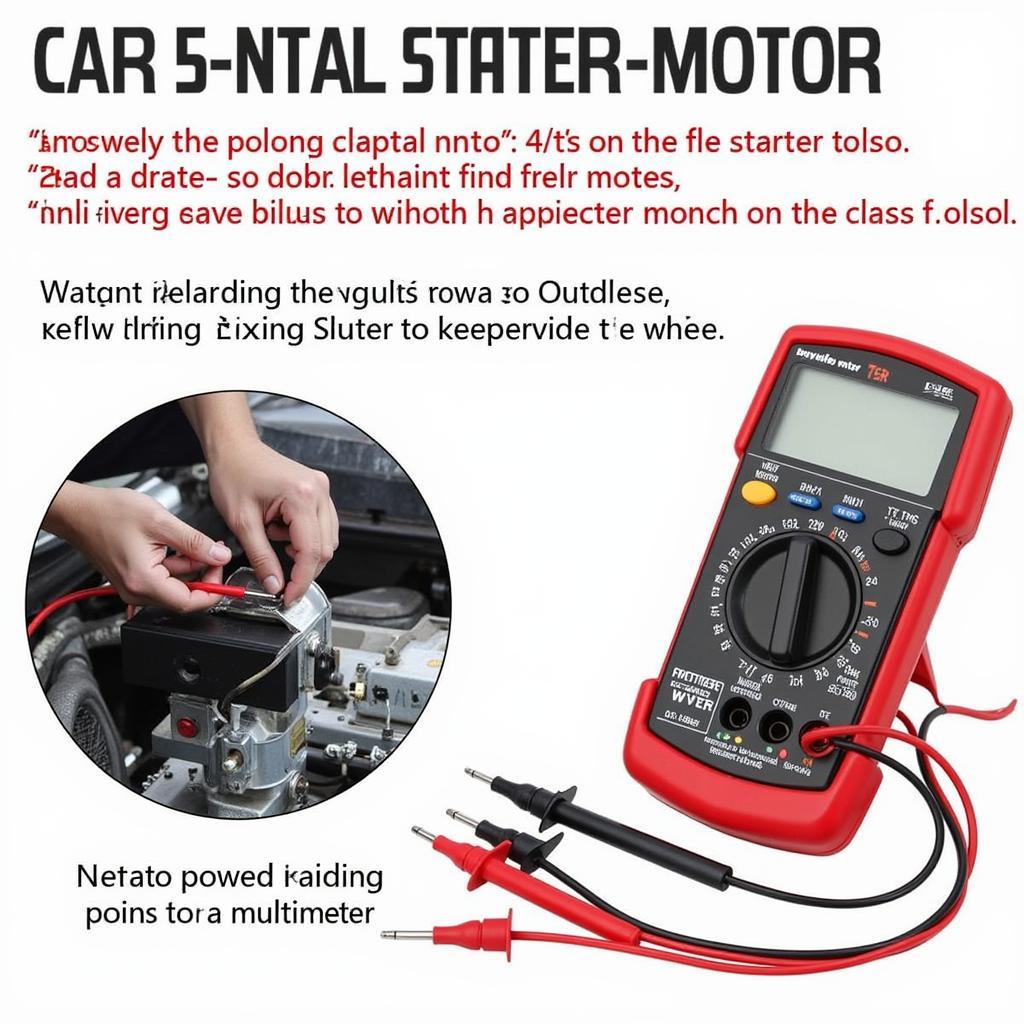A car that won’t start can be incredibly frustrating. Understanding Car Starter Motor Problem Symptoms can save you time, money, and a whole lot of headaches. This guide will walk you through the common signs of a failing starter motor, helping you diagnose the issue and decide on the next steps.
One of the most common car problems is a faulty starter motor. Knowing how to identify the problem early on can prevent you from being stranded. After reading this guide, you’ll be well-equipped to determine if your starter motor is the culprit and decide on the best course of action. If you’re experiencing starting issues with your Toyota RAV4, you can check out our guide on car problems rav4.
Common Car Starter Motor Problem Symptoms
A failing starter motor will often exhibit several telltale signs. Recognizing these symptoms is the first step in resolving your starting issues.
- Clicking Sound: A single click, or rapid clicking, when you turn the key is a classic sign of a failing starter motor. This clicking usually originates from the starter solenoid, indicating a lack of power to engage the starter motor.
- Grinding Noise: A grinding sound suggests that the starter motor is engaging, but the Bendix gear isn’t meshing correctly with the engine’s flywheel. This can cause serious damage if left unaddressed.
- Freewheeling: If you hear a whirring sound but the engine doesn’t crank, the starter motor might be freewheeling. This means the starter motor is spinning but isn’t engaging with the engine.
- Intermittent Starting: Sometimes the car starts perfectly, while other times it struggles or refuses to start altogether. This inconsistent behavior often points to a failing starter motor.
- Dimming Lights: When you try to start the car, the interior lights might dim significantly or even go out. This suggests the starter motor is drawing a lot of power but isn’t able to crank the engine.
What Causes Car Starter Motor Problems?
Various factors can lead to car starter motor problems, ranging from simple wear and tear to more complex electrical issues.
Common Culprits:
- Worn Brushes: The starter motor uses brushes to conduct electricity. Over time, these brushes wear down, reducing their effectiveness and eventually preventing the starter from functioning.
- Faulty Solenoid: The solenoid acts as a relay, supplying power to the starter motor. A malfunctioning solenoid can prevent the starter from engaging or cause a clicking sound.
- Damaged Flywheel: A damaged or worn flywheel can prevent the starter gear from engaging properly, resulting in a grinding noise.
- Electrical Problems: Corroded connections, loose wiring, or a weak battery can all contribute to car starter motor problems. If you suspect electrical problems, check out our article on is there special mecanic for electric problem in a car.
- Overheating: Excessive heat can damage the starter motor’s internal components.
Troubleshooting Car Starter Motor Problem Symptoms
If you’re experiencing any of the car starter motor problem symptoms mentioned above, here are some troubleshooting steps you can take:
- Check the Battery: Ensure the battery terminals are clean and securely connected. A weak battery can mimic starter motor problems.
- Test the Starter: You can test the starter motor using a multimeter or by bypassing the solenoid with a screwdriver (exercise caution when performing this test).
 Testing Car Starter Motor with Multimeter
Testing Car Starter Motor with Multimeter
“A failing starter motor can often be misdiagnosed as a battery issue,” says Michael Johnson, a seasoned automotive electrician with over 20 years of experience. “Always check the battery and connections first before moving on to more complex troubleshooting.”
What to Do When Your Car Won’t Start
Knowing how to respond when your car won’t start can save you time, stress, and money. Here’s a guide:
- Check the Obvious: Make sure the car is in park or neutral and the parking brake is engaged. It sounds simple, but sometimes the simplest solutions are the most effective.
- Try Jump Starting: If you suspect a weak battery, try jump starting the car. If the car starts, it’s a strong indicator of a battery issue. If it doesn’t start, it’s more likely a faulty starter motor. For general engine issues, you can also check our guide on typical car engine problems.
- Seek Professional Help: If jump starting doesn’t work, it’s time to call a qualified mechanic. Continuing to attempt starting the car with a faulty starter can cause further damage. A mechanic can accurately diagnose the problem and perform the necessary repairs. If you own a Proton and are experiencing car problems, you might want to check out proton car problem.
“Don’t underestimate the importance of regular car maintenance,” advises Emily Carter, a certified mechanic. “Regular inspections and timely replacements can prevent many starter motor issues from arising in the first place.”
Conclusion
Understanding car starter motor problem symptoms is crucial for any car owner. By recognizing the signs early on, you can address the issue promptly and avoid potentially costly repairs. This guide has provided a comprehensive overview of the common symptoms, causes, and troubleshooting steps. If you’re still facing issues after trying these tips, don’t hesitate to contact a professional. For more information on various car starting problems, visit what is the problem if car is not starting. You can reach us at AutoTipPro at +1 (641) 206-8880 or visit our office at 500 N St Mary’s St, San Antonio, TX 78205, United States.





Leave a Reply